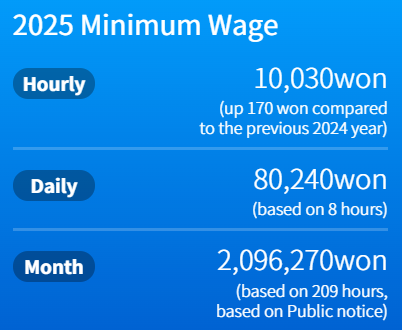The minimum wage for 2025 in Korea is set at 10,030 KRW per hour. This policy plays a significant role, particularly for newcomers to the workforce, highlighting the importance of understanding its implications and background.
Background of the Minimum Wage System
The minimum wage system involves government intervention in the wage determination process between labor and management. It sets a legal baseline, requiring employers to pay workers above a specific minimum wage.
This system originated in New Zealand, following a large-scale strike led by shipping workers. To resolve disputes, a law was introduced, empowering arbitration tribunals to establish minimum wages during labor conflicts.
In Korea, efforts to address low wages date back decades. However, systemic solutions were necessary to secure a stable living standard for workers. In 1986, Korea enacted the Minimum Wage Act, and the policy was implemented nationwide in 1988. Furthermore, Article 32, Paragraph 1 of the Korean Constitution mandates state efforts to promote employment and guarantee fair wages, reinforcing the foundation of the minimum wage system.
Significance of the Minimum Wage
1. Securing Workers’ Livelihoods
The primary objective of the minimum wage system is to protect workers’ livelihoods. By legally enforcing a wage floor, it ensures that employees can meet their basic needs, such as food and housing. However, for this system to be truly effective, the minimum wage must realistically reflect living costs and economic conditions, ensuring that workers and their families lead dignified lives.
2. Enhancing Labor Productivity
Higher wages directly contribute to increased labor productivity. When workers earn adequate wages, their quality of life improves, enabling them to invest in education and personal development. Conversely, low wages may force workers into excessive overtime, negatively impacting their health and limiting opportunities for skill enhancement.
3. Promoting Fair Competition Among Employers
The minimum wage fosters fair competition by preventing businesses from exploiting low wages to gain an unfair advantage. Instead, companies are encouraged to compete through improved productivity, enhanced product quality, and better management practices. This ensures a level playing field and benefits the broader economy.
The minimum wage system is not just a policy—it’s a reflection of societal values that prioritize fair treatment, economic stability, and workers’ welfare. By understanding its purpose and history, we can better appreciate its role in shaping a just and equitable labor market.
For further details, visit the official site. https://www.minimumwage.go.kr/english/main.do
